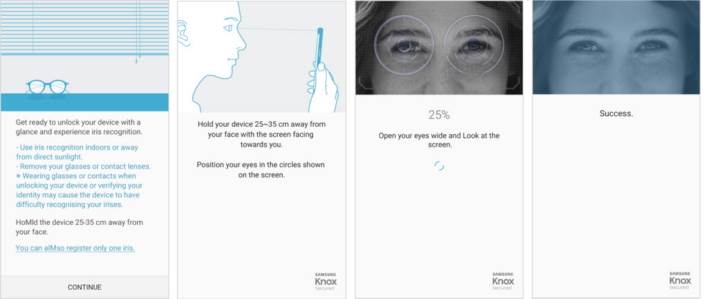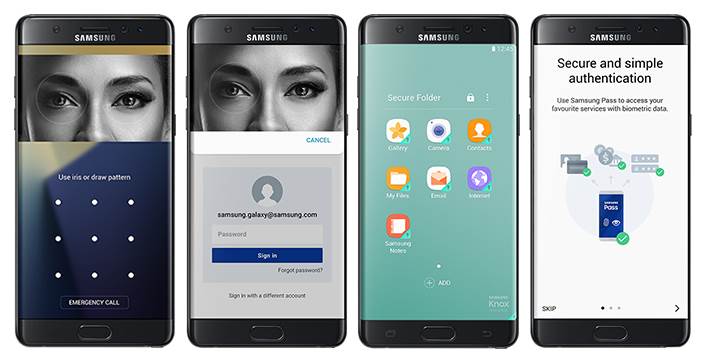
The Galaxy Note7’s new iris scanning technology provides users with an additional form of authentication to reinforce security. But new technology can raise a lot of questions. Here is a list of FAQs to clarify anything you might have been wondering about the Galaxy Note7’s iris scanner.
Q. How do I save my iris data on the Galaxy Note7? Isn’t it difficult?
Registering your iris information is not only incredibly easy, but it’s fast, too. All you need to do is access the Irises tab from the Lock screen and security menu in Settings to register one or both of your irises.
Simply hold your device 25-35 centimeters from your face with the screen facing toward you, position your eyes in the circles shown on the screen and follow the prompts. In a matter of seconds, the iris sensor extracts your iris patterns, codes them into a digital form and saves them in the secure TrustZone of Knox.

Q. Does the iris scanner work if I wear glasses or contact lenses? What about if I’ve had LASIK/LASEK surgery?
When you wear eyeglasses, reflected glare from surrounding lights may interfere with iris scanning and recognition. Also, if your lenses are very thick or have a special coating, scanning and recognition speed may be affected. This is also the case for tinted or decorative contact lenses. With sunglasses, the iris scanner does not work properly because sunglass lenses block IR light.
If you have undergone an eye operation like LASIK or LASEK, you will need to re-register your iris information on the device, as the operation may cause slight changes to your cornea and subsequently affect the refraction of light from the iris sensor to your eyes. Likewise, if your eyes are severely swollen or not completely open, the iris scanner may not be able to read your irises.
Q. Can I use the iris scanner anywhere? If the iris scanner can’t recognize my irises, how can I access my Galaxy Note7?
Using the iris scanner in direct sunlight or under bright light may affect the accuracy of the sensor. For maximum effectiveness, move to an area that is slightly shaded when using the iris scanner. A dirty iris camera can also affect the scanner’s reading, so in the case that it doesn’t work, try cleaning the area above the screen.
Additionally, you can unlock the device with an alternative method such as your fingerprint (if it is registered), a pattern, PIN or password. (You will also need to use your selected non-biometric alternative method when the device has been restarted or has been inactive for 24 hours.)
Q. What functions can I use with the iris scanner?
The Galaxy Note7’s iris recognition technology allows for all-around reinforced mobile security for functions such as unlocking your device, or verifying your identity in place of your Samsung account.
The device’s iris scanner can be used to activate Samsung Pass, a new feature that acts as a master key for mobile banking services and automatic website login on the Samsung Internet browser. You can also add another layer of security to value-added services like Samsung Pay, as well as safely complete mobile banking transactions or lock private data through Secure Folder.
For enterprise users, iris scanning technology can be utilized to authenticate access to the Knox Workspace container.

Q. Is iris scanning really safer than fingerprint scanning?
While fingerprint and iris authentication both provide a high level of security, iris scanning is one of the most secure and reliable biometric techniques available today. This is because each individual has a uniquely different and highly intricate iris pattern in each eye, which is almost impossible to replicate.
Furthermore, users can only register the iris pattern(s) of one person on each device, which means that even if the smartphone is stolen or lost and someone else is able to gain access to the smartphone, the user’s iris information won’t be compromised.
Lastly, iris scanning results in fewer false acceptances than fingerprint scanning, according to some studies.
Q. Where does the iris information get stored once it’s registered? Does it get processed safely? If I use it to login to a website, or for a mobile banking transaction, does it get saved on the server?
With the Galaxy Note7, registered iris data is stored safely in the hardware by Samsung’s trusted Knox platform, just as fingerprint data has been stored in the past.
This means that when iris data is used for user authentication for web log-in or Samsung Pay, for example, it is not in its raw form. Instead, it is digitized and encrypted as a code which is stored at the hardware level. Therefore, Knox provides an added level of security so users can be confident that their personal information is always safe.
Q. There’s a red light that flickers when I use the iris scanner. What is it, and isn’t it bad for my eyes?
This red light is an infrared LED, and it enables the best range for iris scanning to ensure maximum accuracy. It is completely safe to use and there are no health implications associated with the technology. It has even received the highest International Electrotechnical Commission IEC62471 certification level.
In addition, the light will automatically switch off if the device detects that your eyes are too close or exposed to the IR LED for more than nine seconds.
*All functionality features, specifications and other product information provided in this document including, but not limited to, the benefits, design, pricing, components, performance, availability, and capabilities of the product are subject to change without notice or obligation.







